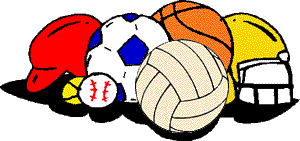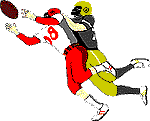|
November 22, 2002
 If you play high school sports, especially football or soccer, you are at
risk for a head injury such as a concussion. A concussion is defined by
the American Academy of Neurology as a
"trauma-induced alteration in mental status that may or may not involve
loss of consciousness." So, a person does not need to become unconscious
to have suffered a concussion. Rather, any change in mental status such
as memory loss or confusion are signs of a concussion.
If you play high school sports, especially football or soccer, you are at
risk for a head injury such as a concussion. A concussion is defined by
the American Academy of Neurology as a
"trauma-induced alteration in mental status that may or may not involve
loss of consciousness." So, a person does not need to become unconscious
to have suffered a concussion. Rather, any change in mental status such
as memory loss or confusion are signs of a concussion.
 What if you have already had one concussion? Are you
more likely to have another? Will your next concussion be worse than your
first? These questions were asked by Dr. Michael Collins and a team of
researchers from the University of Pittsburgh and the University of
British Columbia. The researchers divided high school athletes who had
had a concussion into two groups: those who had suffered only one
concussion (60 athletes; average age, 15.8 years) and those who had
suffered three or more concussions (28 athletes; average age, 16.1 years).
Compared to athletes who had suffered only one concussion, athletes who
suffered from multiple concussions were: What if you have already had one concussion? Are you
more likely to have another? Will your next concussion be worse than your
first? These questions were asked by Dr. Michael Collins and a team of
researchers from the University of Pittsburgh and the University of
British Columbia. The researchers divided high school athletes who had
had a concussion into two groups: those who had suffered only one
concussion (60 athletes; average age, 15.8 years) and those who had
suffered three or more concussions (28 athletes; average age, 16.1 years).
Compared to athletes who had suffered only one concussion, athletes who
suffered from multiple concussions were:
 6.7 times more likely to lose
consiousness 6.7 times more likely to lose
consiousness
 3.8 times more likely to have memory problems
for events immediately after the injury 3.8 times more likely to have memory problems
for events immediately after the injury
 4.1 times more likely to become confused 4.1 times more likely to become confused
 4.4 times more likely to have an altered
mental state for more than five minutes 4.4 times more likely to have an altered
mental state for more than five minutes
 9.3 times more likely to have 3-4 signs of a
concussion. 9.3 times more likely to have 3-4 signs of a
concussion.
Head trauma may cause concussion-related symptoms by increasing the need
of neurons for glucose, the fuel that neurons use. Concussions may also
be caused by reductions in blood flow within the brain. It is unknown how
multiple concussions influence a neuron's need for glucose or
affect on brain blood flow. | 

![[email]](./gif/menue.gif)



